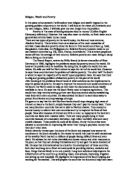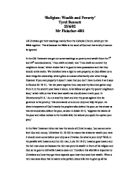There are many benefits of giving charity, for example, increase of wealth, protection from calamities, great riches in heaven, forgiveness, and the afore-mentioned purification of the soul. Verses 5-22 in Surah 76 describe the glorious riches to be bestowed upon those who help the needy, in heaven.
Allah has also spoken of the punishments of those who do not pay in the Quraan: “That which they hoard will be made a collar (in the form of a snake) on the day of the resurrection.” This verse has been corroborated by a hadith of the prophet (p.b.u.h) which reports that he non-payer’s wealth will be turned into a venomous snake which will devour its owner and strangle him continuously thus Allah mentions the collar.
There is one other essential charity known as sadaqat-ul-fitr which is paid on Eid-ul-fitr, so that the poor may also enjoy this occasion. It is £1.50 per head and is to be paid before the Eid prayer. It is obligatory on those on whom Zakah is obligatory but age is not a factor and the father has to pay on behalf of his children.
In addition to essential charities there are also many voluntary charities for example:
-
Sadaqah-a voluntary act of alms for the cause of Allah, by Muslims who want to contribute more than their obligatory Zakah payment. There is no fixed amount for Sadaqah but rather you can give how much you want. The benefits are very similar to those of Zakah.
-
Sadaqah Jaariyah (continuous charity)-is money given for amenities which are purchased and their benefits are reaped and continued even after the death of the benefactor. The reward reaches him even after his death until the service has finished.
-
Waqf-property/land contributed to charitable organisations for use at their discretion.
-
Aqeeqah-refers to the ceremony which takes place on the 7th day of an infant’s life. The hair of head is shaved and its weight in silver is given to charity.
-
Qurbani-buying an animal who’s meat is distributed amongst the poor on the festival of Eid-ul-Adha.
The beneficiaries of charity must also try to support themselves, through lawful means, if able to do so. Dependence of an able person on anyone else is a communal humiliation and a religious disgrace. Earning one’s livelihood is a duty, which is blessed, rather than begging which is frowned upon in Islam. The holy prophet (p.b.u.h) has said: “It is far better for one to take his rope, cut some wood, pile it and sell it rather than to beg others.”
Money can also be misused in many ways, the most common being interest or usury. This term, according to the oxford English dictionary, means ‘lending of money at a ridiculous or illegal interest rate’. The taking and/or giving of interest is totally haram in Islam. Usury gives to the rich and takes from the poor; this is totally against the concept of Zakah, and both parties lose out. The poor grow more indebted and the rich become richer and greedier, thus Islam forbids taking or giving interest.
The North-South divide is the socio-economic divide which separates the rich North or the developed world, from the poor south otherwise known as the developing or third world. The phrase ‘rich north, poor south’ is sometimes used.
As countries become economically developed, they may become part of the “Rich North”, regardless of their geographical location, while any other countries which do not qualify for “developed” status are considered to be part of the “Poor South”.
Every single human being, regardless of race, religion, or culture, has a right to live an average life and have the basic necessities of life, which are: clean drinking water, food, shelter, clothing, education, employment and medical care. The world is an unjust place and not everyone is fortunate enough to have these bare necessities.
Education provides the key to a better future, helping people to fulfil their potential and pursue their goals in life. For millions of people across the developing world even basic education is simply out of reach.
Poverty is closely linked to illiteracy-as both cause and consequence. Without basic literacy or skills the opportunities for people to break free from poverty are limited. “Are those equal, those who know and those who do not know?” (Qur’an 39:9)
Living in unhygienic conditions with little food and no clean water, millions of people are prone to malnutrition and ill health. Poverty creates a vicious cycle where the weak and malnourished easily fall ill, while those already suffering from disease become especially vulnerable to severe malnutrition.
Without water no human being can live for more than 3 days. Although these poor people have access to water it is nearly always deadly and contains illnesses such as cholera and diarrhoea. Nutrition is needed to live and this can only be obtained through food. Nearly 12 million children under the age of 5 die ever year, and half of these deaths are caused by the primary effects of malnutrition. Malnourished children are 12 times more likely to die from preventable diseases such as diarrhoea and respiratory infection. If all the food in the world were equally distributed, every person would be able to consume 2,760 calories a day and be healthy and well-fed but sadly, this is not so, which is why there is a need for world development.
There is too much inequality and injustices in the world, developed countries are rich, developing countries are getting richer and less developed countries (LDC’s) are still very poor which is also why there is a need for world development.
Moreover, because governments themselves in the South prevent their countries developing, by taking loans, and so adding to this divide. For example, Nigeria’s wealth helps drive the global economy, yet almost a third of its people live on less than 50p a day. LDC’s take loans from developed countries who charge sky-scraping rates of interest. They are forced to grow cash crops like coffee, tea and tobacco when they could be growing food for their people.
There is a need for world development because lack of development leads to:
- Suffering due to hunger
- Inability to respond to natural disasters e.g. earthquakes, floods etc.
- Resentment which in turn can lead to wars and terrorism
- Corruption in LDC’s
- Cycles of depression
Furthermore, because short term charitable organisations lead to recurring problems, over-dependence on aid, decline in self-esteem and self-reliance, all these and more reasons for the need of world development.
The G8 summit is a group of 8 nations who gather together annually to discuss the major problems of the day. The G8 summits have already achieved many concrete things such as setting up the Global Fund to Fight AIDS, Tuberculosis and Malaria (Global Health Fund), establishing a new relationship with Africa with the G8 Africa Action Plan in response to the African-led New Partnership for Africa’s Development (NEPAD), making safe nuclear facilities in Russia, launching the Heavily Indebted Poor Countries (HIPC) Initiative, an agreed process for cancelling the debt of the world’s poorest countries and action against money laundering.
My chosen Muslim Charity Organisation is Islamic Relief (IR).Islamic Relief is an international relief and development charity organisation addressing the needs of the world’s poorest people. It is an independent Non-Governmental Organisation (NGO) founded in Birmingham and established in 1984. 20 years on, and the organisation has grown seven figure budgets and hundreds of thousands of beneficiaries. The Islamic Relief logo is shown on the left.
It has only one central aim, which they try to achieve: ‘to alleviate the poverty and suffering of the world’s poorest people’.
Islamic Relief’s work ranges from emergency relief to long-term impact on projects in areas such as water and sanitation, health and nutrition, orphan sponsorship. They have managed to improve the lives of millions of people over the last 20 year.
Education and Training – Education projects have a long-term impact on poverty reduction. Islamic Relief schools and training centres throughout the world provide the means by which the poor can find a way out of the cycle of poverty.
Health & Nutrition – Islamic Relief is committed to providing healthcare and basic medication and health education to the poor and needy. Many hospitals and mobile clinics have been set up over the last 20 years.
Orphan Sponsorship – In ten countries around the world, Islamic Relief cares for over five thousand orphans and their families, either through one-to-one sponsorship or through general welfare funds.
Water & Sanitation – Islamic Relief is committed to helping communities gain access to clean water through its various water projects. By digging wells, building water supply systems and creating sanitation facilities, they hope to give as many people as possible access to this essential service.
Income Generation – Islamic Relief believes in helping people to help themselves. Their income-generation projects aim to help individuals utilise their own skills and resources to become self-reliant and try to re-construct their lives.
Emergency Relief – Their Emergency Response Unit is always on standby, ready to reach victims in the shortest possible time. Their priority is always to provide the basic necessities of food, water, shelter and medical treatment to as many people as possible.
Here are a few of their projects underway in the Pakistan earthquake-affected areas:
- Twenty earthmoving vehicles opening roads
- Food distributions to 180,000 people over 6 months
- Delivering medicines worth £2 million
- Providing access to clean water and to sanitation facilities
- Supplying 10,000 families with tents
- Warm clothing to 25,000 survivors
They have also helped and are still helping for the Southeast Asia tsunami. Here is the Islamic Relief’s intervention in Banda Aceh (Indonesia) at a glance:
- Distribution of 400 family sized tents among survivors
- Loaning to the public to help re-establish businesses
- Over 400 permanent homes under construction
- Funding carpentry training for 42 people
- Health clinics have been built and mobile health clinics are sent
- Wells dug and pumps installed
- 20 schools rebuilt
- 174 lavatories built in 20 different locations
- Tailors, fishing boats, rickshaws and other forms of aid have been supplied
Islamic Relief works in two general areas: It collects money on the one hand and implements projects on the other. Islamic Relief therefore maintains two types of offices: fundraising offices and field offices.
Islamic Relief has 14 field offices spread across different countries where they work, including Albania, Azerbaijan, Bangladesh, Bosnia, Chechnya, Egypt, India, Iraq, Kosovo, Mali, Pakistan, Palestine and Sudan.
Through the generosity of the donor community over the past twenty years, Islamic Relief has earned a reputation for its capacity to help the poor and vulnerable. Islamic Relief is now a well known and respected aid agency committed to the world’s poorest people.
Websites
www.islamic-relief.com
www.g8.gov.uk
www.en.wikipedia.org/poverty
Books
Faza’il-e-Sadaqaat - Parts 1 & 2 by Muhammad Zakariyya Kaandhlawi, Altaf & Sons.






